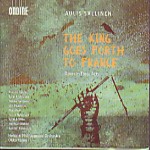Aulis Sallinen’s The King Goes Forth to France had its premiere in London and Savonlinna, Finland in 1984 (it was a joint commission from the Royal Opera and Savonlinna Opera Festival). It is a strange work, more ironic than outright comic. The libretto, by Paavo Haavikko, is chock-full of symbolism and barbed humor about power, war, and simple madness, and the entire package is an enjoyable if odd experience. There’s no way not to keep your emotional distance from this work; the music is too artful and the plot too absurd, and the fact that there is a narrator who speaks directly to us makes certain that we always know how “stagey” the occurrences are.
The plot takes place some time in the future, when The King of England (the “Prince”), along with four women who wish to be his queen (two Carolines and two Annes), his Prime Minister, Parliament (a large cannon), and army must leave England because it is being overwhelmed by an ice age. They flee over a frozen English Channel and seem to travel back in time to the Battle of Crécy and the Siege of Calais, with the eventual hope of reaching Paris. They meet up with the Blind King of Bohemia and an army of Genoese crossbowmen who help them out until the Prince (now “King”) orders the crossbowmen slaughtered. As the plot moves on, the King becomes more cruel, arrogant, and out-of-touch; the allegorical air is filled with the fact that his stupid march is as meaningless as mankind’s nasty expedition. And a passage about the destructiveness of time and its power over both rich and poor offers another message. But don’t get me wrong–it does not preach. There’s just a fierce undercurrent of seriousness lurking despite its outward silliness.
Sallinen is a colorful composer, working within tonal boundaries and using the orchestra for masterly flavoring and description. It can bite like Shostakovich when it has to, but the vocal lines are more accented and lyrical–not unlike Janácek with a hint of Britten. There’s snappy use of percussion–wood blocks, snare drum, etc.–to remind us of the awkwardness of the characters and their military pretensions, and the bass clarinet, at once sinister and funny-sounding in this context, pops out of the orchestral fiber often. When The Caroline with the Thick Mane (the others are called The Nice Caroline, The Anne Who Strips, and The Anne who Steals), who is crazy, imagines her wedding day, bells in the background, slightly off, tell us what’s happening. Brass fanfares are frequent enough to mean nothing; again, the irony. Action is swift; the opera clocks in at just a little more than two hours.
To single out individual performances would be to defeat the opera, which works like a well-oiled, surreal machine; there are no weak links. Of course Tommi Hakala’s King and Jyrki Korhonen’s Prime Minister are standouts by the sheer amount of music they have to sing and the straight faces they must present, but the four women are equally fine. Okko Kamu leads the Helsinki Philharmonic with clarity and a serious smile. Sallinen’s tangy music and apparently sly wit make this a fascinating show, and following the work with the libretto reaps many rewards. A vibrant, unique work. [5/4/2006]
































